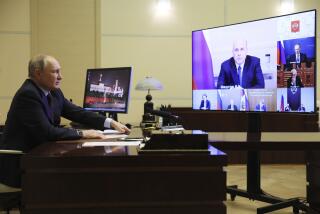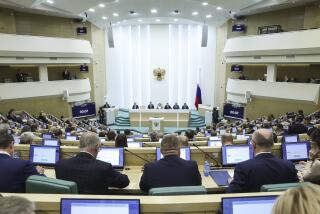Reduced Nuclear Threat Has Congress Fired Up Over Tests
- Share via
WASHINGTON — The contrast was striking: In Washington, leaders of the two Cold War-era superpowers announced they had reached a historic agreement on nuclear arms reduction. Three days later, at a site in the Nevada desert, the United States carried out an underground nuclear test.
The timing was particularly irritating to members of Congress and others who contend that, in light of the collapse of the Soviet Union and its nuclear threat, such tests should be banned.
Now Congress hopes to do something about it. An amendment that would enact a one-year moratorium on the testing of nuclear weapons has been tacked onto the defense authorization bill. It was approved by the House in early June and now moves to the Senate, where a vote is expected this summer.
The measure, authored by Rep. Mike Kopetski (D-Ore.), calls for a yearlong freeze on the testing of nuclear weapons, to be suspended only if one of the former Soviet states conducts a test during that period. Russia has had a similar moratorium in effect since last fall, and the last Soviet nuclear test was conducted in October, 1990.
But opposition to the bill is equally intense. The Bush Administration argues that, because the country will continue to rely on nuclear weapons as a deterrent, testing them for safety remains critical.
BACKGROUND: The United States now conducts six tests per year, which the Pentagon says is fewer than at any time since a 1958-1961 moratorium. The 1963 Limited Test Ban Treaty between the two superpowers prohibits nuclear explosions in the atmosphere, outer space, and under water. The Threshold Test Ban Treaty, signed in 1974, restricts each explosion to less than 150 kilotons. Only the United States, China and Britain are conducting nuclear tests. France also has a one-year moratorium in effect.
If the United States adopts the proposed moratorium, Britain almost certainly will follow suit, said Matthew Bunn, associate director of the Arms Control Assn., a Washington-based group that favors the test ban. Even China, he argued, would come under intense pressure to stop testing to assuage its allies in the Third World who oppose the tests.
The House passed several pieces of test ban legislation in the 1980s, but none survived the Senate.
ISSUES: Although there were some signs of disagreement within the Administration before the U.S.-Russian summit two weeks ago, officials now have come out strongly against any reduction in testing.
Defense Secretary Dick Cheney has argued that the country’s remaining stockpile must be tested to ensure its safety and effectiveness, and that new safety features need to be tested.
Cheney disputes the argument that halting tests would discourage “rogue nations” such as Iraq and North Korea from pursuing nuclear arms programs.
Yet Senate Majority Leader George J. Mitchell (D-Me.) blasted the Administration for conducting an underground nuclear test within days of the June 16 signing of the historic arms reduction agreement.
Russian President Boris N. Yeltsin made no secret of his hope that a moratorium would be part of the arms agreement, particularly since his nation, its economy in tatters, can ill afford such tests. Although the issue was not discussed publicly during the two-day summit in Washington, Yeltsin reportedly told congressional leaders that he was disappointed by the Administration’s refusal to halt testing.
OUTLOOK: With 52 co-sponsors in the Senate, the nuclear test ban amendment is likely to be easily approved. However, it would not necessarily remain part of the defense authorization bill.
Administration officials have recommended that the President veto the defense bill if it reaches his desk in its current form. The nuclear testing moratorium is just one of many provisions to which the President’s advisers object, and it is unclear whether the test ban itself would bring a veto.
Two hundred thirty-seven House members voted for the amendment, far short of the two-thirds needed to override a veto.
More to Read
Sign up for Essential California
The most important California stories and recommendations in your inbox every morning.
You may occasionally receive promotional content from the Los Angeles Times.













